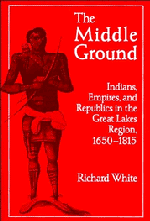Book contents
- Frontmatter
- Contents
- List of abbreviations
- Introduction
- 1 Refugees: a world made of fragments
- 2 The middle ground
- 3 The fur trade
- 4 The alliance
- 5 Republicans and rebels
- 6 The clash of empires
- 7 Pontiac and the restoration of the middle ground
- 8 The British alliance
- 9 The contest of villagers
- 10 Confederacies
- 11 The politics of benevolence
- Epilogue: Assimilation and otherness
- Index
- Frontmatter
- Contents
- List of abbreviations
- Introduction
- 1 Refugees: a world made of fragments
- 2 The middle ground
- 3 The fur trade
- 4 The alliance
- 5 Republicans and rebels
- 6 The clash of empires
- 7 Pontiac and the restoration of the middle ground
- 8 The British alliance
- 9 The contest of villagers
- 10 Confederacies
- 11 The politics of benevolence
- Epilogue: Assimilation and otherness
- Index
Summary
There is no king in the tribe, but a chief who is not a chief of state [and] has no authority at his disposal, no power of coercion, no means of giving an order. The chief is not a commander; the people of the tribe are under no obligation to obey. The space of the chieftanship is not the locus of power, and the “profile” of the primitive chief in no way foreshadows that of a future despot.
Pierre Clastres, Society Against the StateOut of the French and Algonquian triumph over the Iroquois there evolved during the eighteenth century a Janus-faced alliance. Facing east, the French appeared at the head of an Algonquian host. This was the alliance armed and breathing fire in the service of imperial France, the alliance that cowed the Iroquois and repeatedly fought the far more numerous British to a standstill. This eastern face of the alliance is too often the only one that appears in histories of the eighteenth century, but by itself it is incomplete and inscrutable. To explain why Algonquian warriors responded when Onontio summoned them, it is necessary to examine the other face of the alliance. Facing west, Onontio and his chiefs – French and Algonquian – ideally carried the calumet, not the hatchet. They sought to cover the dead, not to avenge them. Onontio was a benefactor. He mediated the quarrels of his Algonquian children. He supplied their needs with presents and trade. Only when faced with disobedient children did Onontio appear armed and angry.
- Type
- Chapter
- Information
- The Middle GroundIndians, Empires, and Republics in the Great Lakes Region, 1650–1815, pp. 142 - 185Publisher: Cambridge University PressPrint publication year: 1991



